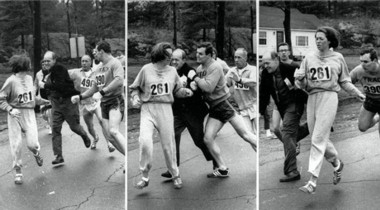Remembering the Bread and Roses Strike
In the late 19th and early 20th centuries, the city of Lawrence was a flourishing center of the textile industry. But that success came on the backs of unskilled immigrant workers, the majority of them young women and girls, who toiled long hours for little pay and lived in deplorable conditions in cramped, run-down housing.
In 1911, state lawmakers passed a bill that offered modest relief for workers: it reduced the maximum number of weekly hours women and children could work from 56 to 54. In response, factory owners cut workers’ wages, to recoup their lost profits. And so the workers walked out.
Their strike was known as the Bread and Roses Strike—inspired by a line from a speech by labor activist Rose Schneiderman, who said, “The worker must have bread, but she must have roses, too”—and lasted two months before ending with a settlement that gave the workers higher wages and overtime pay, among other concessions.
On Oct. 23 at 7 p.m., labor historian Robert Forrant, a professor at UMass-Lowell and one-time worker at Springfield’s now-closed American Bosch plant, will read from his new book, Lawrence and the 1912 Bread and Roses Strike (Arcadia Publishing), at South Hadley’s Odyssey Books. The book, co-authored by Susan Grabski, executive director of the Lawrence History Center, includes about 200 images of the strike and life in Lawrence at the time.
A Community Building
The government may be in lockdown and the economy may be slagging along, but that hasn’t stopped Brattleboro from raising half a million dollars to renovate its historic Latchis Theatre, which has been a focal point of the downtown scene since 1938.
“Due to the outpouring of generosity and affection for the Latchis Theatre, this community and our partners have contributed $518,000 toward the $550,000 goal,” the theatre’s website (www.latchisarts.org) reads. “Holy cow!”
Renovations to the Latchis include new seating, safety upgrades, enhanced lighting and a refurbished zodiac array on its ceiling. The theatre, which was closed on August 1 of this year, re-opens October 19, with an event headlined by noted documentary filmmaker and Hampshire College alum Ken Burns.
Burns will introduce and screen episode five, “1933-1939: The Rising Road,” from his upcoming seven-part PBS series The Roosevelts: An Intimate History. The episode was chosen to coincide with the founding of the Latchis.
The event serves both as a celebration of the threatre’s renovations and a fundraiser for the final $30,000 needed to complete them. See the Latchis website for details.
Running on Gender Equality
For years, the Boston Marathon was a men-only event. Then, in 1967, Katherine Switzer challenged the race’s unquestioned policy of gender discrimination. She registered as “K. Switzer,” and was already running the race before anyone realized she was a woman. Switzer received a body check by race organizer Jock Semple for her troubles—the two later became friends—along with enduring admiration that came from playing such a pivotal role in advancing our cultural concepts of gender, athleticism and ability.
After finishing the marathon that year, Switzer went on to champion women’s athletics and long-distance running in particular, providing television commentary for races in Chicago, New York, Los Angeles and, of course, Boston. She also authored the memoir Marathon Woman, and was inducted into the National Women’s Hall of Fame in 2011.
This week Switzer visits the Valley, where she will speak on Breaking Through: The Power of Resilience at 7 p.m. on Thursday, Oct. 17 in Mount Holyoke College’s Gamble Auditorium. See www.mtholyoke.edu/wcl/events/katherineswitzer for details.
By the Numbers
6: That’s the percentage of kindergartners in Franklin County who received religious or medical exemptions from required vaccinations in the 2012-13 school year, according to the Mass. Department of Public Health.
In Hampshire County, the exemption rate was 4.2 percent; in Berkshire County, 3.2 percent; in Hampden County, 1.3 percent. The statewide exemption rate was 1.52 percent.
Medical exemptions require documentation from a physician; religious exemptions require a written statement from a parent saying immunizations “conflict with their sincere religious beliefs.” The commonwealth does not grant exemptions for philosophical opposition.
Worth Quoting
“These symbolic gestures don’t solve the problem. As long as the government is shut down, it doesn’t matter who I donate to.”
—U.S. Rep. Jim McGovern (D-Massachusetts 2nd District), on whether Congresspeople should donate their paychecks to charity to show solidarity with their furloughed staff members and others suffering financial hardship during the shutdown
Congressional Pay: To Take It or Not to Take It
As Moveon.com’s Courage Campaign and others like it garnered more than half a million signatures last week from people demanding that pay be stopped for Congress during government shutdowns, Massachusetts congresspeople varied as to their positions on donating their checks, which they will receive under current law, to charity. Both senators, Edward Markey and Elizabeth Warren, are donating their checks. As for representatives, John Tierney (Salem) and Niki Tsongas (Lowell) pledged to donate their checks. At press time, Richard Neal (Springfield) and James McGovern (Worcester), who represent Valley communities, were undecided, as was Michael Capuano (Somerville). Joe Kennedy III (Brookline) and Stephen Lynch (South Boston) had “no plans” to donate their checks; William Keating (Bourne) did not respond to the question, which was put to the Massachusetts delegation by the Boston Globe.



